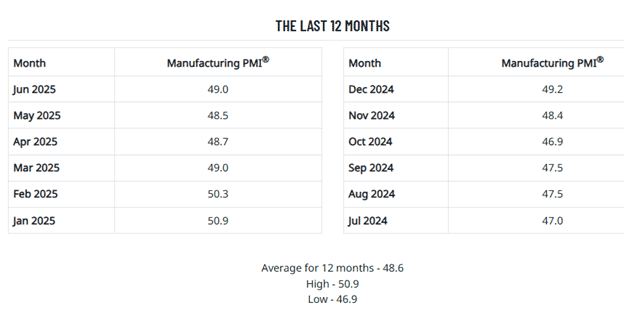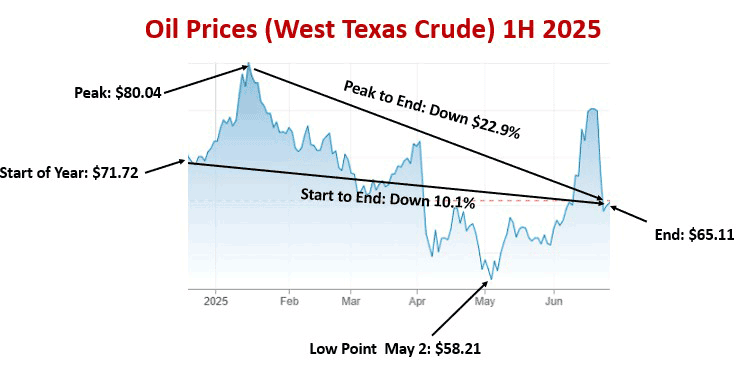As part of our usual review of each half year in supply chain, I recently took a look at the top stories by month in 1H 2025 (see The Top Supply Chain Stories by Month 1H 2025.).
This week, we offer our popular look at the first six months of 2025 in numbers and charts.
We always start with a check on the US and global economy, as that has such an impact in the end on supply chain practice.
Gilmore Says.... |
 That left ecommerce sales as a share of total retail at 16,2%, by the way the Census Bureau measures it, for the fourth straight quarter. That left ecommerce sales as a share of total retail at 16,2%, by the way the Census Bureau measures it, for the fourth straight quarter.
. |
What do you say? |
|
| Click here to send us your comments |
|
|
In Q1 we saw real GDP growth of a weak 0.5%, down from 2.4% in Q4 2024. The first estimate of Q2 GDP will be released any day now.
In terms of the full year, in April the International Monetary Fund (IMF) forecast US GDP at a weak 1.8% growth for all 2025, 2.8% for overall global growth, and 4.0% for China.
One measure of the health of the US manufacturing sector is the US Purchasing Managers Index from the Institute of Supply Management.
As shown below, the PMI has been below the key 50 mark that separates US manufacturing expansion from contraction for 10 out of 12 months, and indeed it has been 30 out of the last 32 months underwater.

Source: ISM
So mixed signals on the economy, with weak but and barely positive Q1 GDP, then likely a somewhat better Q2, but the PMI indicating a prolonged manufacturing slump, with weak forecasts for full year growth.
Another view of US manufacturing strength is the index on US factory output from the Federal Reserve.
The index for June came out at 100.2, making it a number of months the measure came in around the 100 level, and in June was up just 0.8% versus 2024. However, the June score is still well below the 105 level in February 2020 right before the COVID crisis.
In fact, at index level of 100.2, it means US manufacturing output is barely above the baseline year of 2017 levels (index = 100) now eight long years later.
It was a slight down six months for oil prices in the first half of the year. At the start of January crude was $71.72 per barrel, and it jumped from there to a 1H peak of $80.04 in February. It was mostly down from there until the end of May, when the price surged to about $75.0, but ending June at $65.11.That meant a modest decline for the 1H of 10.1%.

US on-the-road diesel prices were flattish, starting the year at $3.56 per gallon, and ending in June at $3.72, with a peak of $3.77 in the third week of June at $3.77, after a 20-cent rise for the week.
Freight volumes were mixed but mostly down, as the “freight recession” continued on now for more than two years.
The Freight Tonnage Index from the ATA for June showed volumes in Q2 basically flat versus Q1, up just 0.2%. Full 1H tonnage similarly was just 0.1% compared to 2024.
The full index reading for June was 113.3, versus the baseline of the average month in 2015 (index = 100), meaning 10 years later US freight tonnage is only up 13.3%.
It was a decent first half for US railroads. Total combined US carloads and intermodal cars were up 3.9% to 12.6 million, as rail cars rose 2.4% to 5.7 million with intermodal up a solid 5.1% to 6.9 million units.
Ocean container shipping rates were down in the first half, with the China Containerized Freight Index starting the year at 1547, then falling to a low in April of 1102 before rising back to 1342 at the end of June.
Ecommerce sales were just flat in Q1, the most recent number we have. That left ecommerce sales as a share of total retail at 16,2%, by the way the Census Bureau measures it, for the fourth straight quarter.
I have lots more but am out of space. Hope you enjoyed all this.
What is your reaction of 1H supply chain 2025 in numbers and charts? What numbers would you add? Let us know your thought at the Feedback section below.
Your Comments/Feedback
|